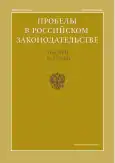Actual Biomedicine’s Resources of and Criminal Risks
- Authors: Kruchinina N.V.1
-
Affiliations:
- Kutafin Moscow State Law University (MSAL)
- Issue: Vol 17, No 7 (2024)
- Pages: 98-104
- Section: Criminal Law Sciences
- URL: https://journal-vniispk.ru/2072-3164/article/view/284104
- DOI: https://doi.org/10.33693/2072-3164-2024-17-7-098-104
- EDN: https://elibrary.ru/KRZTZO
- ID: 284104
Cite item
Abstract
This article presents various scientific standpoints on the definition of biomedicine. The issues related to the application of biotechnology in medicine are highlighted. It is concluded that biomedical achievements allow to identify mechanisms of diseases, to produce new medical products and drugs, thus widening possibilities to more effectively make diagnosis and treatment. The paper defines the main areas of biomedicine: transplantation of human organs, vaccination, and assisted reproductive technologies. Due to the shortages of human organs and tissues fit for transplantation, modern additive technologies (3D bioprinting) seem the most promising for introducing into medical practice. The paper confirms that especially biomedicine helps to reduce patients’ mortality, as well as to increase their life expectancy and the birth rate in order to address the demographic problems. Ethical and legal problems linked to the use of the achievements of biomedicine are identified. Still there are some medical technologies which are in conflict with centuries-old cultural and religious values. When researching, including the procedures of medical experiments, scientists have to resolve ethical issues. Criminal risks associated with the use of biomedicine are identified. Criminally dangerous and most vulnerable in this respect might be human organ transplantation, pharmaceuticals, biomedical research on human beings, and assisted reproductive technologies. The article stresses that the improvement of legislation in the field of biomedicine should keep on going.
Full Text
##article.viewOnOriginalSite##About the authors
Nadezda V. Kruchinina
Kutafin Moscow State Law University (MSAL)
Author for correspondence.
Email: kriminalistmsal@list.ru
ORCID iD: 0000-0002-1706-6749
Dr.Sci.(Law), Professor, professor of the criminalistics department
Russian Federation, MoscowReferences
- Convention on the Prevention and Punishment of the Crime of Genocide// Bulletin of the Supreme Soviet of the USSR. 1954. No. 12. Art. 244.
- Federal Law of November 21, 2011 No. 323-FZ (as amended on July 2, 2021) "On the Fundamentals of Protecting the Health of Citizens in the Russian Federation" // Collection of Legislation of the Russian Federation. 2011. No. 48. Art. 6724; Collection of Legislation of the Russian Federation. 2021. No. 27 (Part 1). Art. 5186; SPS "ConsultantPlus".
- On approval of the Fundamentals of state policy for the preservation and strengthening of traditional Russian spiritual and moral values: Decree of the President of the Russian Federation dated November 9, 2022 No. 809 // Collection of Legislation of the Russian Federation. 2022. No. 46. Art. 7977.
- Artemov V.M., Savvina O.V. Bioethics: textbook. Moscow: Prospect, 2021.- 240 p.
- Kapitonova E.A., Romanovskaya O.V., Legal regulation of transplantology. Moscow: Prospect, 2022.- 144 p.
- Karkishchenko N.N. Formation and development of biomedicine // Biomedicine. 2006. No. 2. Pp. 5-17.
- Kukushkina A.V. Legal aspects of the development of genetic weapons // Rus. yearbook of international law. 2023 / Rus. associ. international law. - St. Petersburg: OOO "Contrast", 2024.- 312 p.
- Kruchinina N.V. Demography and reproductive human rights: problems and prospects // Legal science in China and Russia. 2021. No. 4. Pp. 101-104.
- Letov O. V. Philosophical problems of biomedicine (review) // Social and humanitarian sciences. Domestic and foreign literature. Ser. 3: Philosophy. 2021. No. 1. Pp. 35-43.
- Mokhov A. A. Legal regulation and ethical support of scientific research: a look through the prism of traditional Russian spiritual and moral values // Legal science and practice: Bulletin of the Nizhny Novgorod Academy of the Ministry of Internal Affairs of Russia. 2024. No. 3 (67). Pp. 62-70.
- Ryzhakova A. A. The moment of human death in the context of the development of biomedical technologies // Law and bioethics of innovative medical technologies: monograph. Moscow: Prospect, 2021. 146 p.
- Modern biomedical law: textbook. Moscow: Prospect, 2023. 480 p.
- Tikhomirov Yu.A. Legal forecasting: scientific and practical manual. Moscow: Institute of Legislation and Comparative Law under the Government of the Russian Federation, 2018.- 198 p.
- Pharmaceutical criminal law of Russia: monograph / A.A. Bimbinov, V.N. Voronin, T.G. Ponyatovskaya et al.; ed. A.I. Rarog. Moscow: Prospect, 2019. 216 p.
- Khomyakova M.A. Human organs and tissues as the subject of crime: monograph. Ekaterinburg: Publishing House of the Ural State Agrarian University, 2024. 192 p.
- Shutova A.A. Criminal risks of medical robots turnover // Russian Journal of Economics and Law. 2023. No. 17 (3). P. 571-585 (https://doi.org/10.21202/2782-2923.2023.3.571-585. EDN: HZDUBN).
- Yavorsky A. N. Biomedicine: the primary source of new technologies // Law and modern technologies in medicine / edited by A. A. Mokhov, O. V. Sushkova. Moscow: Prospect, 2019. P. 93-103.
Supplementary files








